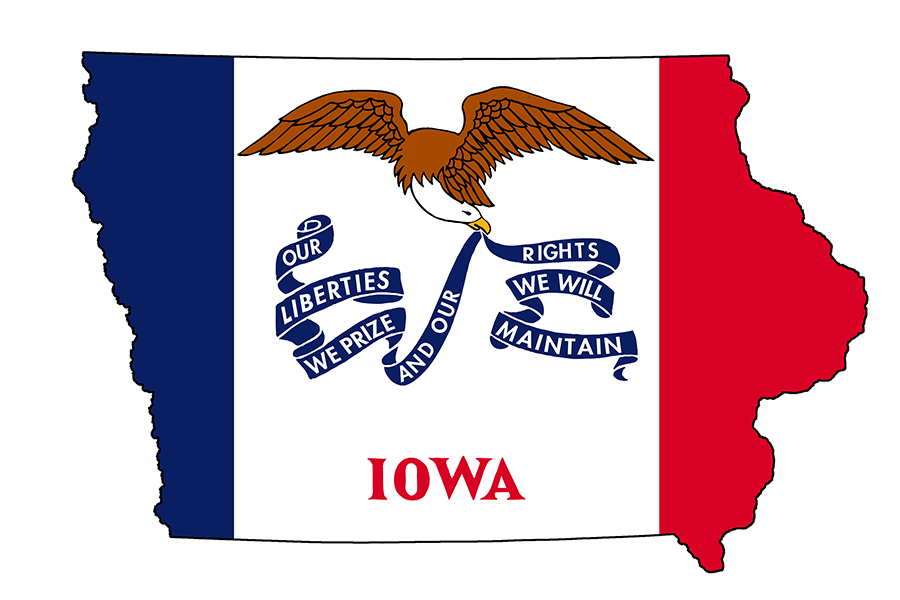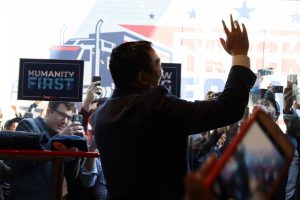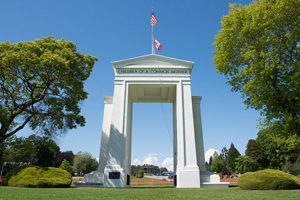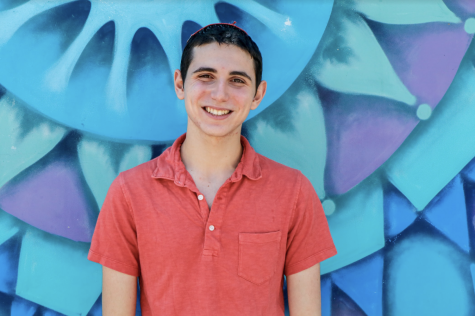Stark divide between teens and adults ahead of Iowa caucuses tonight, polls show
‘Iowa Youth Poll’ reports views of middle- and high-school students
UPCOMING: Residents of Iowa, whose flag is shown above, are casting the first ballots of the 2020 presidential contest at caucuses tonight.
February 3, 2020
 BP Graphic by Eli Weiss
BP Graphic by Eli Weiss
Iowans are gearing up for the first presidential contests in the 2020 nomination process to be held tonight on Monday Feb. 3.
An Iowa youth straw poll of the state’s middle and high school students found that 22.8% supported entrepreneur Andrew Yang, compared to 20.3% for Sen. Bernie Sanders and 17.5% for former South Bend Mayor Pete Buttigieg.
Former Vice President Joe Biden came in fourth with 11.3% among the students, and Tom Steyer came in fifth at 10.1%. The poll of 28,000 students was completed on Jan. 28.
Polls of all Iowan adults, however, have shown different results. Real Clear Politics’ poll average since Jan. 1 shows Sen. Sanders in first place with 22.1% followed by former Vice President Biden with 20.45, Pete Buttigieg 16.72, Elizabeth Warren 15.18, and Amy Klobuchar at 9.72%, while Andrew Yang — the candidate with the highest support among middle- and high-schoolers, came in seventh with 3.36%.
Mr. Biden receives half the support from youth that he does from adults.
In interviews with the Boiling Point, Shalhevet seniors — who because of age requirements are the only Shalhevet students likely to vote in next month’s California presidential primary — think age might have something to do with it.
Senior Kiku Shaw is undecided so far. She said more adults favor former Vice President Biden because he’s “something that is once again, comfortable.”
“They know kind of his standpoint — they are familiar with him,” said Kiku. “And they’ve kind of grown up with him being involved as a politician.”
Senior Evan Rubel, who’s made up his mind but didn’t want to say who he’d be voting for, provided another possible explanation for Biden’s support among adults.
“Biden is considered a person who has more experience at the federal level,” said Evan. “I think that the older demographics will tend to like him more as opposed to someone like Bernie Sanders.”
Senior Anna Weiss said Mr. Yang’s support might be because the policies he’s suggesting are less complicated than those of some other candidates.
“It might be easier to conceptualize the things that Andrew Yang wants to do than the things that other people want to do,” said Anna, who supports Mayor Buttigieg.
Anna said she thought Sen. Sanders and Mr. Yang have the support of young teenagers because they break the mold.
“Their ideas are so radically different from everyone else’s,” said Anna, “which is why I think they stand out differently.”
History teacher Dr. Keith Harris said he thought youth like Mr. Yang because his campaign focuses on the future.
“[It] doesn’t surprise me because he’s really focusing on things like technology and where the future is going.”
Caucuses, like those being held in Iowa, are different from elections. Instead of casting a ballot, in each voting location supporters of candidates separate themselves into groups in different parts of the room, where they are then counted for the first round of voting.
If a particular candidate does not receive 15% support from caucus-goers in the room, then he or she is disqualified from that precinct and voters have to either join another candidate’s group or convince others to join them and help them reach 15%. After voters choose another candidate, a second and final round of counting is then held, the results of which will decide how many delegates to the Democratic convention are allocated to each candidate.
Democrats who receive 15% or above support in Iowa precincts will be eligible to receive delegates allocated to that precinct. Iowa will send a total of 41 delegates to the Democratic convention in July.
The Republican caucuses do not have a minimum viability threshold and will reward delegates proportionally based on the percentages they receive in each precinct.
Due to the persuasion that can occur during a caucus, analysts warn that pre-caucus polling results may not necessarily predict the outcome of caucuses.
“Caucus electorates are the most difficult to model in polling,” said Monmouth University Polling Institute director Patrick Murray in a Monmouth poll summary. “The smartest takeaway from this, or any Iowa poll for that matter, is to be prepared for anything on Monday.”
President Donald Trump is being challenged by former Congressman Joe Walsh and former Gov. Bill Weld of Massachusetts.
The Iowa Youth Straw Poll concluded that President Trump takes the majority of youth support with 91.5% of the vote while his opponents, Joe Walsh and Bill Weld, receive 5.1% and 3.4%, respectively.
The one Republican poll in Iowa, conducted on Oct. 17 last year, showed similar results to that of the youth straw poll, with Trump in the lead in the state at 93%, Bill Weld at 4%, and Joe Walsh at 2%.
At the party national conventions, political parties nominate a candidate to run in the general election for president.
Starting this spring, the Libertarians will hold their nominating convention in Austin, Texas from May 22-25. The Greens will hold their convention in Detroit, Michigan on July 9-12. Then the Democrats will hold their convention in Milwaukee, Wisc., on July 13-16, 2020 followed by the Republicans in Charlotte, N.C., on August 24-27, 2020.
To be the Republican nominee a candidate will need to have 1,276 delegates at the convention. The Democratic nominee will have to receive 1,990 delegates at the convention.
After the Iowa caucuses the Democratic candidates will face off this Friday in the eighth debate, this time from Manchester, N.H. So far Mr. Biden, Sen. Sanders, Sen. Warren, former Mayor Buttigieg, Sen. Klobuchar, businessman Tom Steyer, and Mr. Yang have qualified.
Following the Iowa caucuses, voters will go to the polls in New Hampshire on Feb. 11.
Californians will vote on March 3, otherwise known as “Super Tuesday,” along with 13 other states and one U.S. territory. On that day, 1,334 Democratic delegates — a total of 33% of all delegates, will be up for grabs.
The Libertarian party will hold a caucus in Iowa on Feb. 8.
















